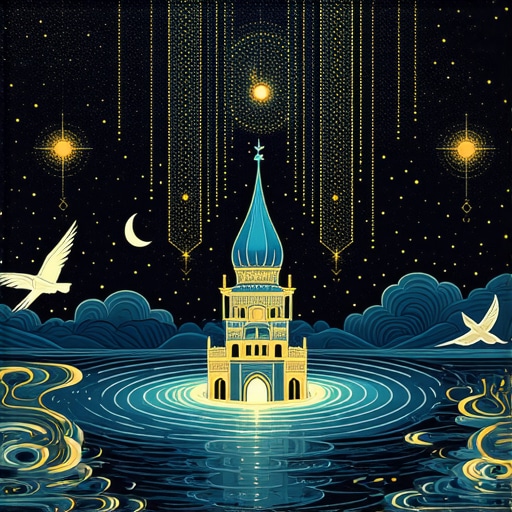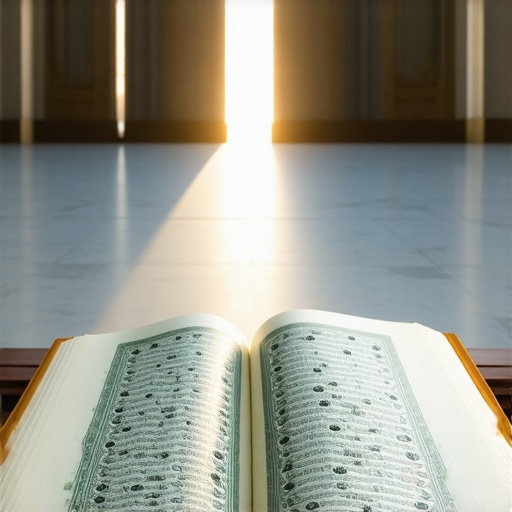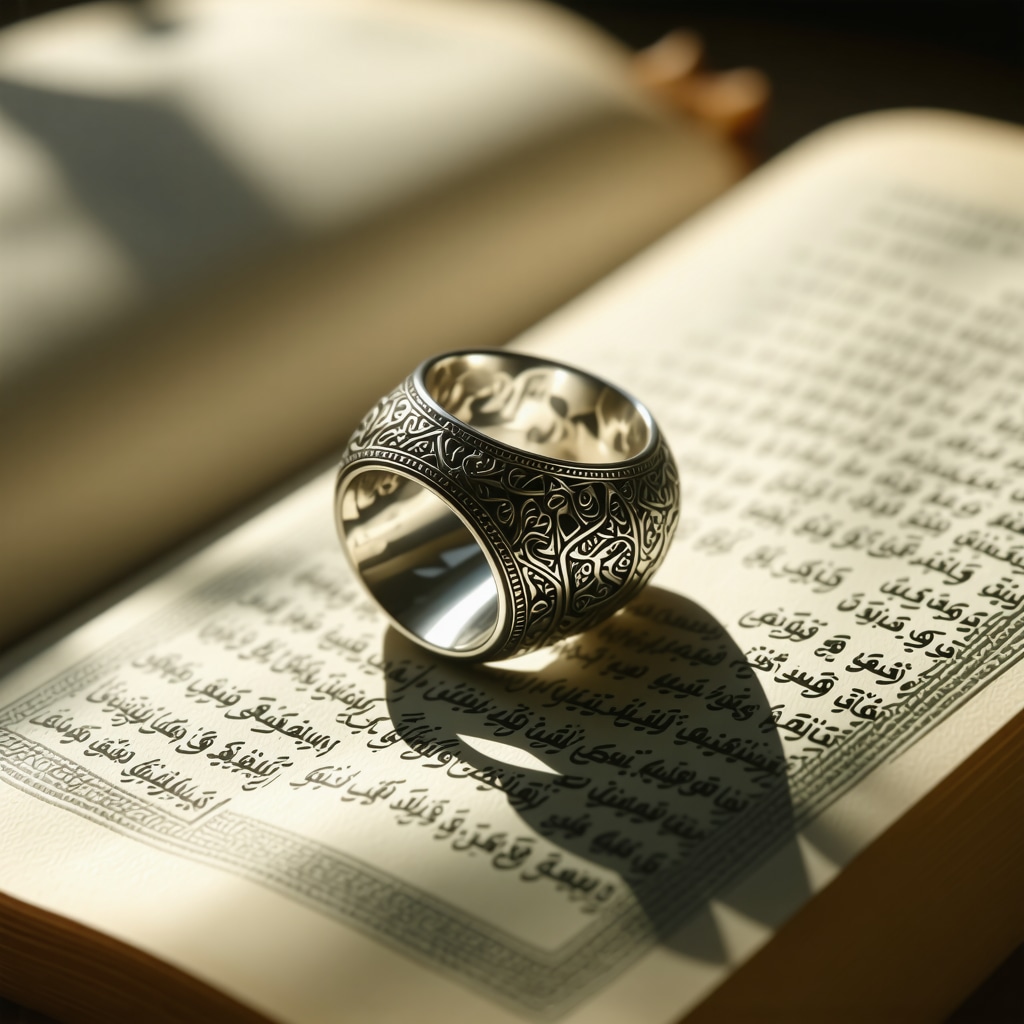Unveiling the Mystical: My Personal Encounter with Angelic Dreams
It all started on a quiet night when I experienced a vivid dream that left me pondering its profound meaning. I saw a luminous angelic figure hovering gracefully, radiating peace and divine serenity. This dream sparked my curiosity about the significance of seeing angels in dreams within Islamic tradition. As I delved deeper, I realized that dreams involving angels are considered sacred signs and divine messages, often guiding believers towards spiritual enlightenment.
The Sacred Symbolism of Angels in Islamic Dreams
In Islamic teachings, angels are seen as messengers of Allah, carrying divine messages and protecting believers. When I researched further, I found that witnessing angels in dreams can symbolize divine support, guidance, or warnings. For instance, according to the Islamic dream dictionary, angels appearing in dreams often indicate that Allah is sending a message or blessing. This aligns with the teachings from authoritative sources like Bushra in Islam, which emphasizes that dreams of angels are good omens and divine communication.
How to Recognize Divine Messages in Your Dreams
One question I often ask myself is, “How can I differentiate between a spiritual message and a mere dream?” Recognizing divine messages involves paying attention to the clarity, emotion, and context of the dream. In Islamic tradition, dreams that invoke feelings of peace, reassurance, or awe are often considered sacred. Moreover, dreams containing angelic figures can serve as reminders of Allah’s mercy or warnings to stay vigilant in faith. Practicing prayer and seeking protection from Shaytan, as recommended in Sunnah for Bad Dreams, can help deepen the understanding of these divine signs.
My Reflection: Embracing Divine Messages with Faith and Gratitude
Experiencing such dreams has profoundly impacted my spiritual journey. I now view dreams of angels not just as mystical visions but as opportunities for divine guidance. I have learned to approach these dreams with gratitude and trust in Allah’s wisdom. Sharing this insight, I encourage others to nurture their spiritual awareness and interpret dreams with sincerity and patience. If you’ve had a similar experience, I invite you to share your story in the comments or explore more about Islamic dream interpretations here.
Unlocking the Hidden Meanings of Dreams: An Islamic Expert’s Perspective
Dreams have long fascinated believers and scholars alike, serving as windows into the divine and the subconscious. As an Islamic dream interpretation expert, I have observed that understanding the symbols and messages within dreams requires a nuanced approach rooted in Quranic teachings, Hadith, and traditional exegesis. For instance, dreams involving water often symbolize spiritual purification or divine mercy, as detailed in Water in Islam. Recognizing these symbols can empower believers to discern divine guidance from their dreams.
The Role of Symbols and Context in Islamic Dream Interpretation
One critical aspect I emphasize is the importance of context and personal circumstances when interpreting dreams. For example, dreaming of a snake can signify danger or temptation, but in some cases, it may also represent spiritual renewal, especially if the snake is slain or tamed, as explored in Dreams about Losing Teeth. Contextual clues within the dream, such as the environment, emotions, and actions, help clarify its true message. Moreover, understanding the symbolism of animals, colors, and objects through Islamic perspectives enhances accuracy in interpretation. For instance, a dream about a bird might symbolize freedom or divine inspiration, depending on the situation, as explained in Islamic Dream Dictionary.
Practical Steps for Recognizing Divine Messages in Your Dreams
Identifying whether a dream is a divine message involves several practical steps. First, pray Istikhara—an Islamic prayer for seeking guidance—before and after sleep to align your subconscious with divine will. Pay attention to feelings of peace, reassurance, or awe, which often indicate a divine message, rather than fear or confusion. Additionally, keeping a dream journal helps track recurring symbols or themes, allowing for pattern recognition over time. Engaging in dhikr (remembrance of Allah) before sleep can also purify your heart and increase the likelihood of receiving meaningful dreams. Remember, the Prophet Muhammad (peace be upon him) advised believers to interpret dreams with sincerity and humility, always seeking Allah’s guidance in understanding these divine signs.
Addressing Challenges in Dream Interpretation: When Symbols Confuse
One common challenge I encounter is when symbols in dreams seem ambiguous or conflicting. For example, dreaming of a dark room might suggest ignorance or hardship, but if accompanied by a light, it could symbolize hope and divine guidance. In such cases, consulting authentic sources like Ibn Sirin’s Dream Dictionary provides valuable insights. Additionally, seeking counsel from knowledgeable scholars or spiritual guides can clarify complex dreams. Remember, the key is patience and reliance on Allah, trusting that with sincere effort, the divine messages embedded in dreams will become clear over time.

Understanding the intricate symbols in Islamic dreams requires a visual connection—an illustrative depiction of dream symbols like water, snakes, and birds can help readers grasp their spiritual significance more vividly.
Have you ever experienced a dream that changed your perspective or guided your actions? Share your story or ask questions in the comments below. For further exploration, consider reading more about Islamic dream symbolism and how to deepen your spiritual understanding through dreams at Islamic Dream Dictionary.
Contemplating the Mystical: What Do Dreams of Angels Really Signify?
Over the years, my personal journey with dreams involving angels has evolved from simple awe to a profound understanding of their intricate symbolism. I’ve noticed that these dreams are not always uniform; sometimes they appear during moments of spiritual clarity, while at other times, they serve as subtle nudges during challenging phases of life. This complexity invites us to reflect deeper on the divine messages embedded within. For example, an angel appearing in a dream might symbolize not just divine support but also a call to heightened piety or an inner transformation that requires active engagement, as highlighted in various Islamic teachings.
Unraveling the Nuances: How Personal Context Shapes Dream Interpretation
One of the most intriguing aspects I’ve encountered is how individual circumstances and emotional states influence dream symbolism. A dream of water, for instance, can mean spiritual purification in one context but could represent emotional turbulence in another. This duality underscores the importance of personal reflection when interpreting dreams. I often advise fellow believers to consider their recent experiences, emotional health, and spiritual goals to better understand their dreams’ messages. This nuanced approach aligns with the Islamic principle that dream meanings are context-dependent and should be approached with sincerity and humility.
How Can Advanced Dream Symbols Reveal Hidden Divine Guidance?
In my practice, I’ve come to appreciate that certain symbols—like animals, colors, or objects—possess layered meanings that can unlock deeper spiritual insights. For example, dreaming of a snake might initially evoke fear, yet in a different context, it could symbolize spiritual renewal or victory over temptation. To decode these symbols, I often consult authoritative sources such as Islamic dream dictionaries and reflect on Quranic verses and prophetic traditions. Recognizing these layered meanings empowers believers to interpret their dreams as authentic channels of divine guidance rather than mere subconscious echoes.
What Are the Ethical and Practical Considerations in Interpreting Dreams?
Beyond analysis, I believe it’s crucial to approach dream interpretation with ethical sensitivity and a sense of responsibility. Misinterpreting a dream can lead to unnecessary worry or misguided actions. Therefore, I always recommend seeking knowledge from reputable scholars or spiritual guides when faced with ambiguous symbols. Additionally, maintaining a sincere intention—asking Allah for clarity and wisdom—ensures that the interpretation remains aligned with divine will. This practice helps convert dream insights into genuine spiritual growth rather than mere speculation.
Have you ever experienced a dream that challenged your understanding or prompted a significant change? How did you navigate its meaning? I invite you to share your reflections or questions below, and if you’re curious to explore more about the subtle art of Islamic dream interpretation, visit this resource for deeper insights.Unveiling the Subtle Nuances of Dream Symbols in Islamic Tradition
In my extensive experience interpreting Islamic dreams, I have come to appreciate the profound complexity embedded within symbols such as water, snakes, and animals. These symbols are not static; their meanings shift based on personal circumstances, spiritual states, and contextual cues. For example, a dream featuring water might symbolize divine mercy and spiritual purification, but if the water appears turbulent or murky, it could indicate internal struggles or unresolved issues. Recognizing these layers requires a deep understanding of Quranic verses, prophetic traditions, and traditional exegeses, such as those detailed in Islamic Dream Dictionary.
Moreover, the symbolism of animals varies widely— a bird often signifies divine inspiration or the soul’s elevation, whereas a snake might represent temptation or spiritual renewal, depending on its portrayal in the dream. This duality underscores the importance of personal reflection and contextual analysis, as emphasized by scholars like Ibn Sirin. By examining the environment, emotional tone, and the dreamer’s current life circumstances, we can unlock deeper divine messages that transcend surface-level interpretations.
How Advanced Symbols Can Unveil Divine Guidance in Your Spiritual Journey
Advanced dream symbols often serve as gateways to hidden divine guidance, especially when they appear during moments of spiritual clarity or personal transformation. For instance, dreaming of a mountain might symbolize strength and resilience, but it could also be a prophetic sign of upcoming challenges or opportunities for ascension. Recognizing these layered meanings requires a nuanced approach—consulting authoritative sources and engaging in supplication, such as istikhara, to seek clarity from Allah. It’s fascinating how colors, objects, and even numbers in dreams can carry profound prophetic insights, as explored in Dreams with Numbers.
My personal journey has shown that maintaining a sincere intention and a humble heart when interpreting dreams enhances receptivity to divine messages. The process is not merely analytical but deeply spiritual, requiring trust in Allah’s wisdom and patience in deciphering signs. This approach transforms dreams from fleeting visions into meaningful dialogues with the divine, enriching our spiritual path.
What Are the Ethical Considerations in Interpreting Sacred Dreams?
Interpreting dreams in Islam carries a significant ethical responsibility. Misinterpretation can lead to unnecessary anxiety or misguided actions, which is why I advocate for a cautious and informed approach. Seeking guidance from knowledgeable scholars or trusted spiritual guides ensures that interpretations align with Islamic principles. Additionally, maintaining the intention of seeking Allah’s guidance, rather than personal gain or curiosity, preserves the sanctity of the process. As the Prophet Muhammad (peace be upon him) advised, dreams should be approached with humility and sincerity, always accompanied by supplication and reliance on Allah’s mercy.
If you have experienced dreams that challenged your understanding or prompted profound change, I encourage you to share your stories or questions. Engaging with a community of believers who value authentic spiritual insights can deepen your comprehension and connection with divine messages. For those eager to explore more advanced interpretations, resources like Ibn Sirin’s Dream Dictionary offer invaluable guidance.
Things I Wish I Knew Earlier (or You Might Find Surprising)
1. Dreams of angels are often messages of reassurance
Looking back, I wish I understood sooner how significant angelic dreams are in Islamic tradition. They are not just mystical visions but divine messages that can bring comfort and guidance during challenging times. My own first encounter with an angel in a dream felt like a warm hug from the divine, reminding me of Allah’s mercy.
2. Recognizing the emotion in your dreams is key
One revelation I had is how the feelings during a dream—peace, awe, or reassurance—are crucial in interpreting its meaning. A peaceful dream with angels often indicates divine support, while fear might suggest a warning or a need for spiritual reflection.
3. Context matters more than you think
Understanding that the environment and your current life circumstances influence dream symbols opened my eyes to deeper meanings. For instance, seeing angels during a time of prayer or piety can be a sign of Allah’s favor, which I learned from trusted Islamic dream interpretations.
4. Dreams can be a call to increased piety
Many times, angelic dreams have inspired me to strengthen my faith and practice more dhikr. They serve as divine nudges to stay on the righteous path and seek closeness to Allah, something I wish I appreciated earlier.
5. Not all dreams of angels are the same—variety has significance
From my experience, angels can appear in different forms—sometimes as gentle protectors, other times as messengers of warnings. Recognizing these differences helps in understanding what Allah might be communicating.
6. The importance of seeking knowledge from authentic sources
Before diving into dream interpretation, I realized how essential it is to consult reputable Islamic texts and scholars. This approach ensures that my understanding remains aligned with authentic teachings, avoiding misconceptions.
Resources I’ve Come to Trust Over Time
- Islamic Dream Dictionary: A comprehensive resource that has helped me decode symbols like angels, water, and animals. It’s invaluable for anyone serious about understanding dreams.
- Bushra in Islam: This site emphasizes dreams as divine communication, reinforcing the spiritual significance of angelic visions.
- Prophetic Traditions on Dreams: Studying hadiths related to dreams deepened my appreciation for their sacred role and how to approach them with humility.
- Scholarly Works on Dream Interpretation: Works by scholars like Ibn Sirin provide historical context and nuanced insights that are still relevant today.
Parting Thoughts from My Perspective
Dreaming of angels in Islam is truly a beautiful reminder of Allah’s mercy and guidance. From my own journey, I’ve learned that these dreams are more than fleeting images—they’re divine messages that can steer us towards righteousness and inner peace. Recognizing the emotional tone, understanding the context, and seeking knowledge from trustworthy sources are key steps in interpreting these sacred visions. If this resonates with you, I’d love to hear your thoughts or experiences. Feel free to share or ask questions—our spiritual journey is richer when shared with others committed to faith and understanding.


